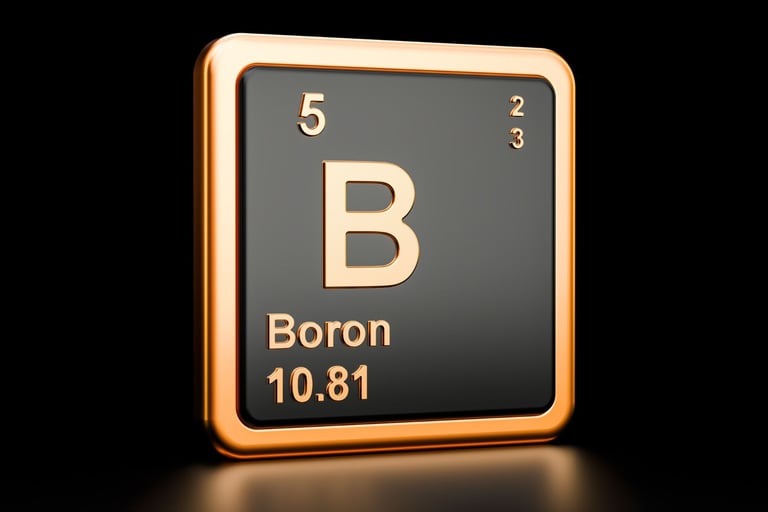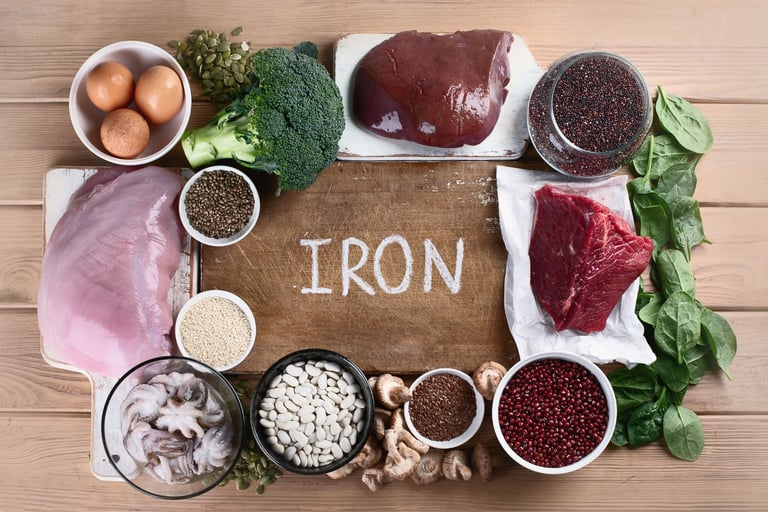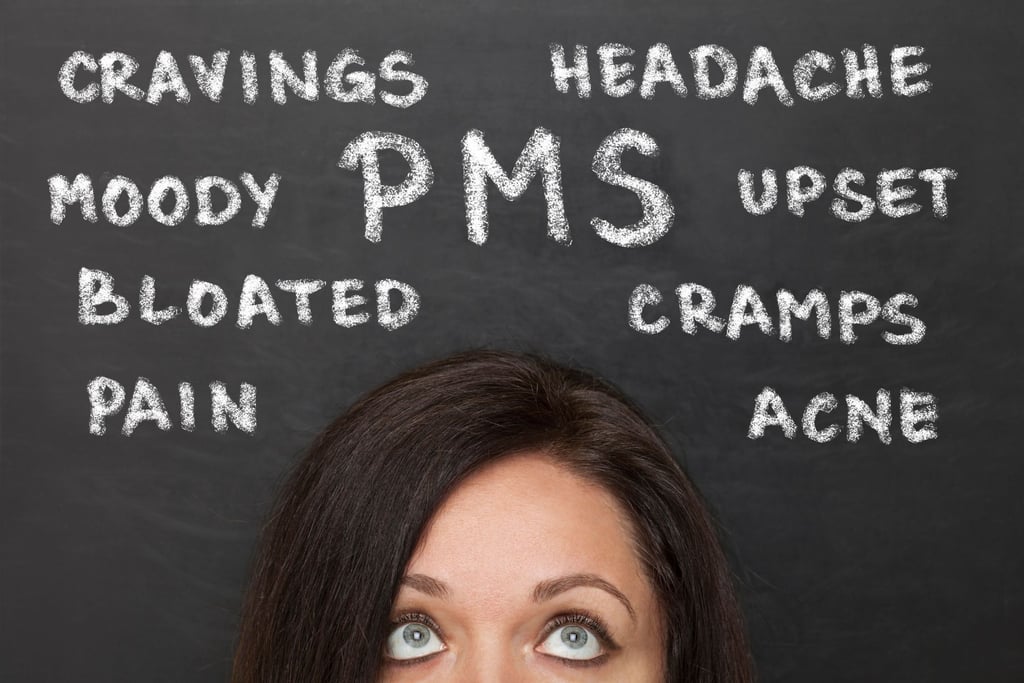The Most Beneficial Minerals for Painful Period Cramps & PMS
FEMALE HEALTHHEALTH & WELLNESS
Written by Keith - Nutritionist, Herbalist, and Reseacher
6 min read
Dealing with severe menstrual cramps and PMS is an exhausting struggle for millions of women around the world. Due to a number of factors such as depleted soils causing deficiencies, pesticides causing hormonal disruption, high levels of stress, and more, the number of women experiencing dysmenorrhea is increasing. The good news is that there are specific minerals that can help move this in the right direction and help make it more manageable. In this article, we explore some of the most beneficial and healing minerals for reducing menstrual cramps and PMS symptoms.
1. Magnesium
Magnesium is an incredibly critical mineral for overall health and well-being. It is needed as a cofactor for hundreds of processes in the body. When the body is low in magnesium, it hampers the body in a multitude of ways. Magnesium is also one of the most important compounds when it comes to cramps, PMS, and other uncomfortable menstrual symptoms. Magnesium helps to calm smooth muscle contractions, ease overall tension in the body, lessen cramp severity, and may lower the production of inflammatory prostaglandins. This combination of qualities makes magnesium particularly effective in improving menstrual cramps.
Studies have shown that increasing your levels can reduce both the severity and duration of menstrual cramps as well as improve PMS symptoms as well. 1, 2 Although magnesium is a critical piece of the puzzle, it is not enough on its own to defeat severe period pains. Magnesium works better with vitamin B6 (in the form of P5P) and boron, which is why we include all three in Calm Cycle. It is difficult to get the full benefits of magnesium from diet alone, but one of the richest sources of it is sprouted pumpkin seeds. Pumpkin seeds also contain zinc, manganese, and a slew of other nutrients, but make sure to look for a sprouted form to improve bioavailability.
2. Calcium
Calcium is another essential mineral that can help alleviate menstrual cramps and reduce pain. It works in combination with magnesium to regulate muscle contractions, and nerve transmission, and promote relaxation. In one double-blind study done in Iran, a group of 66 young women who had been diagnosed with PMS were given a placebo or a calcium supplement to see what the effects would be. The group taking the supplement took 500mg and saw a reduction in symptoms compared to placebo. This corroborated other studies where women experienced physical and emotional benefits when compared to placebo. 3 , 4
The benefits of calcium for PMS and menstrual pain aren't as profound as magnesium, but can still make a difference. Supplementing with calcium isn't always recommended but can be helpful when your diet is lacking adequate amounts. Make sure any supplement has a mixture of different calcium forms and not just calcium carbonate. Also, taking vitamin K2 is important when taking calcium. If you prefer to get all your calcium from your diet, emphasize foods such as A2 dairy products (from goat, sheep, and jersey cows), almond milk, leafy greens, fermented non-gmo soy like tempeh, lentils, salmon, and sardines.
3. Boron
Boron is one of the most underrated and overlooked minerals for health. While it won't work divine miracles, as no single nutrient will, recent studies on boron show tremendous benefits to all-around health. According to research, boron may help protect against toxicity from certain pesticides and heavy metals, raise internal antioxidant defenses, boost vitamin D, calcium, and magnesium absorption, improve the brain's electrical activity, reduce inflammatory markers such as C-reactive protein, and more! 5 Boron is also involved in hormone regulation, which can have a direct impact on menstrual symptoms. That lineup of benefits is impressive for an element that is only needed in such minuscule amounts. In addition, recent research shows potential benefits for menstrual pains.
Menstrual cramps and period pains are heavily influenced by prostaglandins, which are hormone-like compounds that trigger contractions. Specifically, studies show prostaglandins F2 Alpha and E2 to be tied to dysmenorrhea. The more you produce, the more painful the contractions and pain. Boron has been found to inhibit the production of prostaglandins, thereby reducing the intensity of cramps and alleviating period pain. Furthermore, boron can enhance the benefits of calcium and magnesium because of its ability to improve absorption.
A triple-blind clinical study sought to know the effects of boron on female volunteers with primary dysmenorrhea. The group that supplemented with boron started several days before menstruation through the end of it. The study showed that despite only taking boron for a short window, it still reduced the severity and duration of menstrual symptoms. Researchers believe that boron reduced the painful, cramp-promoting prostaglandins, which lowered overall inflammation. 6 It is because of all of these benefits that we include a form of supplemental boron in our product for menstrual pains that took over a year to develop.
4. Zinc
Zinc is a diverse mineral that supports multiple systems of the body including brain, immune, hormonal, and reproductive health. It's been shown to dampen inflammation and improve micro-circulation within reproductive tissues. All of these attributes lead to less menstrual cramps and a happier you. One study on zinc showed that using it alongside mefenamic acid improved the overall effects of menstrual pain and symptoms. Another study showed that supplementing with zinc before menstruation helps promote a more benign menstrual cycle, although not all doses experienced the same benefits.
However, there's one big issue with zinc that these studies don't discuss. Many people experience stomach cramps and pains from taking zinc in supplemental form. This is well-known and the last thing you want when on the verge of menstruation. The best thing to do is to emphasize eating more foods that are high in zinc so you don't need to megadose any isolated vitamins, which may do more harm than good.
Some great foods that are rich in zinc include sprouted pumpkin seeds, oysters, grass-fed beef, sesame seeds, liver, and hemp seeds. Chickpeas and lentils are a decent source as well. If you want to add a supplement, go for a form such as zinc orotate or OptiZinc. However, the body has trouble absorbing 25-30+ mg at a time, which is the typical dose of most zinc supplements. Splitting up your dose into 10-12 mg is much more efficient so you don't end up with stomach cramps and expensive urine. 7,8
5. Potassium
Potassium is another extremely important mineral that influences fluid balance within the cells. While sodium typically pulls fluid out of the cell, potassium brings it in. The potassium-to-sodium ratio is critical when it comes to menstrual pains. Most people consume close to a 1-1 ratio of potassium to sodium when the ideal balance is at least a 2-1 ratio. Making this adjustment helps to reduce bloating and calm severe menstrual cramps. While potassium alone won't do miracles, it is a key element in experiencing more peace and comfort during your cycle. Potassium-rich foods include lentils, salmon, carrot juice, bananas, avocados, sweet and purple potatoes, pomegranate, swiss chard, honeydew, and more.
6. Iron




Iron is a mineral that gets a lot of attention, but is still oftentimes overlooked. It is a major blood-building element that is needed to replace the loss during menstruation. Many women suffer from low-grade anemia and don't know it. While too much iron is a problem, too little causes low blood cell count and terrible weakness. Iron deficiency can exacerbate menstrual cramps and make recovery afterward much more arduous. Deficiencies can even affect the neural development of a fetus when pregnant, so it's important to make sure your levels are within a healthy range.With iron, it's critical to strike that ideal balance, which may require testing to get a more accurate idea. Include iron-rich foods such as grass-fed lamb and beef, beef liver, apricots, lentils, morel mushrooms, oysters, tempeh, and dates.
While these minerals can be extremely helpful in reducing menstrual cramps and period pains, it's important to know your specific needs, which sometimes requires nutrient testing. While many people are deficient in minerals, you also don't want to have an excess either. This may be more likely to occur with too much supplementation vs having a nutrient-rich diet. There are many reasons that some women may be prone to experiencing a higher level of menstrual pain than others. However, it's important to know that improvement is always possible no matter how severe your cramps and pain may feel. A multi-faceted approach of emphasizing important nutrients within your diet, light exercise, cutting down on toxic foods, and taking a good supplement should help tremendously in defeating those stubborn period cramps and irritating symptoms.
References:
1. https://www.ijwhr.net/pdf/pdf_IJWHR_624.pdf
2. https://www.ncbi.nlm.nih.gov/pmc/articles/PMC3208934/
3. https://www.ncbi.nlm.nih.gov/pmc/articles/PMC5313351/
4. https://faseb.onlinelibrary.wiley.com/doi/abs/10.1096/fasebj.31.1_supplement.799.3
5. https://www.ncbi.nlm.nih.gov/pmc/articles/PMC4712861/
6. https://pubmed.ncbi.nlm.nih.gov/25906949/

